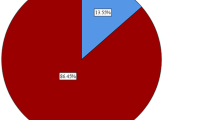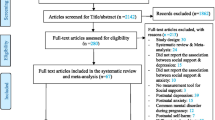Abstract
Background
The infertility associated with primary ovarian insufficiency (POI) presents significant emotional challenges requiring psychosocial adjustment. Few investigations have explored the longitudinal process of adaptation to POI.
Purpose
This longitudinal investigation tests a model of adjustment to POI that includes separate psychosocial vulnerability and resilience resource factors.
Methods
Among 102 women with POI, personal attributes reflective of vulnerability and resilience were assessed at baseline. Coping strategies were assessed 4 months later and measures of distress and well-being 12 months later.
Results
As hypothesized, confirmatory factor analysis yielded separate, inversely correlated vulnerability and resilience resource factors at baseline, and distress and well-being factors at 12 months. Contrary to predictions, maladaptive and adaptive coping strategies were not bi-factorial. Moreover, a single stand-alone strategy, avoidance (i.e., refusing to acknowledge stress), mediated the association between baseline vulnerability and 12-month distress.
Conclusions
For women with POI, interventional studies targeted to reduce avoidance are indicated.


Similar content being viewed by others
Abbreviations
- POI:
-
Primary ovarian insufficiency
References
Chandra A, Martinez GM, Mosher WD, Abma JC, Jones J. Fertility, family planning, and reproductive health of U.S. women: Data from the 2002 National Survey of Family Growth. Vital Health Stat. 2005; 23: 1-160.
Cousineau TM, Domar AD. Psychological impact of infertility. Best Pract Res Clin Obstet Gynaecol. 2007; 21: 293-308.
Gonzalez LO. Infertility as a transformational process: A framework for psychotherapeutic support of infertile women. Issues Ment Health Nurs. 2000; 21: 619-633.
Greil AL. Infertility and psychological distress: A critical review of the literature. Soc Sci Med. 1997; 45: 1679-1704.
Domar AD, Zuttermeister PC, Friedman R. The psychological impact of infertility: A comparison with patients with other medical conditions. J Psychosom Obstet Gynaecol. 1993; 14(Suppl): 45-52.
Nelson LM. Clinical practice. Primary ovarian insufficiency. N Engl J Med. 2009; 360: 606-614.
Rebar RW, Connolly HV. Clinical features of young women with hypergonadotropic amenorrhea. Fertil Steril. 1990; 53: 804-810.
Nelson LM, Anasti JN, Kimzey LM, et al. Development of luteinized graafian follicles in patients with karyotypically normal spontaneous premature ovarian failure. J Clin Endocrinol Metab. 1994; 79: 1470-1475.
Coulam CB, Adamson SC, Annegers JF. Incidence of premature ovarian failure. Obstet Gynecol. 1986; 67: 604-606.
Schmidt PJ, Cardoso GM, Ross JL, et al. Shyness, social anxiety, and impaired self-esteem in Turner syndrome and premature ovarian failure. JAMA. 2006; 295: 1374-1376.
Orshan SA, Ventura JL, Covington SN, et al. Women with spontaneous 46, XX primary ovarian insufficiency (hypergonadotropic hypogonadism) have lower perceived social support than control women. Fertil Steril. 2009; 92: 688-693.
Davis M, Ventura JL, Wieners M, et al. The psychosocial transition associated with spontaneous 46, XX primary ovarian insufficiency: illness uncertainty, stigma, goal flexibility, and purpose in life as factors in emotional health. Fertil Steril. 2010; 93: 2321-2329.
Ryff CD, Singer B. The contours of positive human health. Psychol Inq. 1998; 9: 1-28.
Taylor SE, Stanton AL. Coping resources, coping processes, and mental health. Annu Rev Clin Psychol. 2007; 3: 377-401.
McCrae RR, Costa PT. Personality, coping, and coping effectiveness in an adult sample. J Pers. 1986; 54: 385-405.
Bolger N. Coping as a personality process: A prospective study. J Pers Soc Psychol. 1990; 59: 525-537.
Mancini AD, Bonanno GA. Predictors and parameters of resilience to loss: Toward an individual differences model. J Pers. 2009; 77: 1805-1832.
Wright LJ, Zautra AJ, Going S. Adaptation to early knee osteoarthritis: the role of risk, resilience, and disease severity on pain and physical functioning. Ann Behav Med. 2008; 36: 70-80.
Mahajan NN, Turnbull DA, Davies MJ, et al. Adjustment to infertility: The role of intrapersonal and interpersonal resources/vulnerabilities. Hum Reprod. 2009; 24: 906-912.
Glover L, Hunter M, Richards JM, Katz M, Abel PD. Development of the fertility adjustment scale. Fertil Steril. 1999; 72: 623-628.
Litt MD, Tennen H, Affleck G, Klock S. Coping and cognitive factors in adaptation to in vitro fertilization failure. J Behav Med. 1992; 15: 171-187.
Schneider MG, Forthofer MS. Associations of psychosocial factors with the stress of infertility treatment. Health Soc Work. 2005; 30: 183-191.
Verhaak CM, Smeenk JM, Evers AW, et al. Predicting emotional response to unsuccessful fertility treatment: A prospective study. J Behav Med. 2005; 28: 181-190.
Kraaij V, Garnefski N, Vlietstra A. Cognitive coping and depressive symptoms in definitive infertility: A prospective study. J Psychosom Obstet Gynaecol. 2008; 29: 9-16.
Peterson BD, Newton CR, Rosen KH, Skaggs GE. The relationship between coping and depression in men and women referred for in vitro fertilization. Fertil Steril. 2006; 85: 802-804.
Morrow KA, Thoreson RW, Penney LL. Predictors of psychological distress among infertility clinic patients. J Consult Clin Psychol. 1995; 63: 163-167.
Bayley TM, Slade P, Lashen H. Relationships between attachment, appraisal, coping and adjustment in men and women experiencing infertility concerns. Hum Reprod. 2009; 24: 2827-2837.
Benyamini Y, Gefen-Bardarian Y, Gozlan M, Tabiv G, Shiloh S, Kokia E. Coping specificity: The case of women coping with infertility treatments. Psychol Health. 2008; 23: 221-241.
Ryff CD, Dienberg Love G, Urry HL, et al. Psychological well-being and ill-being: Do they have distinct or mirrored biological correlates? Psychother Psychosom. 2006; 75: 85-95.
Keyes CL. The mental health continuum: From languishing to flourishing in life. J Health Soc Behav. 2002; 43: 207-222.
Singer BH, Ryff CD, Carr D, Magee WJ. Linking life histories and mental health: A person centered strategy. In: Refferty A, ed. Sociological Methodoloogy. Washington: American Psychological Association; 1998.
Masse R, Poulin C, Dassa C, Lambert J, Belair S, Battaglini A. The structure of mental health: Higher order confirmatory factor analyses of psychological distress and wellbeing measures. Soc Indic Res. 1998; 45: 475-504.
Keyes CL. Mental illness and/or mental health? Investigating axioms of the complete state model of health. J Consult Clin Psychol. 2005; 73: 539-548.
Kraaij V, Garnefski N, Schroevers MJ. Coping, goal adjustment, and positive and negative affect in definitive infertility. J Health Psychol. 2009; 14: 18-26.
John OP. The “big five” factor taxonomy: Dimensions of personality in the natural language and in questionnaires. In: Pervin LA, ed. Handbook of Personality: Theory and Research. New York: Guilford; 1990.
Lennon MC, Link BG, Marbach JJ, Dohrenwend BP. The stigma of chronic facial pain and its impact on social relationships. Soc Probl. 1989; 36: 117-133.
Mishel MH. The measurement of uncertainty in illness. Nurs Res. 1981; 30: 258-263.
Scheier MF, Carver CS, Bridges MW. Distinguishing optimism from neuroticism (and trait anxiety, self-mastery, and self-esteem): A reevaluation of the life orientation test. J Pers Soc Psychol. 1994; 67: 1063-1078.
Rosenberg M. Conceiving the Self. New York: Basic Books; 1979.
Pearlin LI, Schooler C. The structure of coping. J Health Soc Behav. 1978; 19: 2-21.
Block J, Kremen AM. IQ and ego-resiliency: Conceptual and empirical connections and separateness. J Pers Soc Psychol. 1996; 70: 349-361.
Carver CS, Scheier MF, Weintraub JK. Assessing coping strategies: A theoretically based approach. J Pers Soc Psychol. 1989; 56: 267-283.
Wrosch C, Scheier MF, Miller GE, Schulz R, Carver CS. Adaptive self-regulation of unattainable goals: Goal disengagement, goal reengagement, and subjective well-being. Pers Soc Psychol Bull. 2003; 29: 1494-1508.
Antoni MH, Lehman JM, Kilbourn KM, et al. Cognitive-behavioral stress management intervention decreases the prevalence of depression and enhances benefit finding among women under treatment for early-stage breast cancer. Health Psychol. 2001; 20: 20-32.
Radloff LS. The CES-D scale: A self-report depression scale for research in the general population. Appl Psychol Meas. 1977; 1: 3485-3401.
Spielberger CD. State-Trait Anxiety Inventory: A Comprehensive Bibliography. Palo Alto: Consulting Psychologists Press; 1983.
Watson D, Clark LA, Tellegen A. Development and validation of brief measures of positive and negative affect: The PANAS scales. J Pers Soc Psychol. 1988; 54: 1063-1070.
Ryff CD, Keyes CL. The structure of psychological well-being revisited. J Pers Soc Psychol. 1995; 69: 719-727.
Muthen LK, Muthen BO. MPLUS User’s Guide 6th ed. Los Angeles, CA: Muthen & Muthen; 1998–2010.
Bentler PM. Comparative fit indexes in structural models. Psychol Bull. 1990; 107: 238-246.
Steiger JH, Lind JC. Statistically Based Tests for the Number of Factors. Iowa City: Psychometric Society; 1980.
Joreskog KC, Sorbom D. LISREL V User’s Guide. Chicago: National Educational Resources; 1981.
Hu L, Bentler P. Cutoff criteria for fit indexes in covariance structure analysis: Conventional criteria versus new alternatives. Struct Equ Model. 1999; 6: 1-55.
Curran P, Bollen KA, Chen F, Paxton P, Kirby JB. Finite sampling properties of the point estimates and confidence intervals of the RMSEA. Sociol Method Res. 2003; 32: 208-252.
Abbey A, Halman LJ, Andrews FM. Psychosocial, treatment, and demographic predictors of the stress associated with infertility. Fertil Steril. 1992; 57: 122-128.
Domar AD, Broome A, Zuttermeister PC, Seibel M, Friedman R. The prevalence and predictability of depression in infertile women. Fertil Steril. 1992; 58: 1158-1163.
Edelmann RJ, Connolly KJ. Psychological aspects of infertility. Br J Med Psychol. 1986; 59(Pt 3): 209-219.
McEwan KL, Costello CG, Taylor PJ. Adjustment to infertility. J Abnorm Psychol. 1987; 96: 108-116.
Gallo LC, Fortmann AL, Roesch SC, et al. Socioeconomic status, psychosocial resources and risk, and cardiometabolic risk in Mexican-American women. Health Psychol. 2012; 31: 334-342.
Smith BW, Zautra AJ. Vulnerability and resilience in women with arthritis: Test of a two-factor model. J Consult Clin Psychol. 2008; 76: 799-810.
Kohn PM. On coping adaptively with daily hassles. In: Diener M, ed. Handbook of Coping: Theory, Research Applications. New York: Wiley; 1996.
Heim E, Augustiny KF, Schaffner L, Valach L. Coping with breast cancer over time and situation. J Psychosom Res. 1993; 37: 523-542.
Lazarus RS, Folkman S. Stress, Appraisal, and Coping. New York: Springer; 1984.
Folkman S. Personal control and stress and coping processes: A theoretical analysis. J Pers Soc Psychol. 1984; 46: 839-852.
Larsen RJ, Ketelaar T. Personality and susceptibility to positive and negative emotional states. J Pers Soc Psychol. 1991; 61: 132-140.
Meyer GJS Jr. Structural convergence of mood and personality: Evidence for old and new directions. J Pers Soc Psychol. 1989; 57: 691-706.
Reich JW, Zautra AJ, Davis MC. Dimensions of affect relationships: Models and their integrative implications. Rev Gen Psychol. 2003; 7: 66-83.
Zautra AJ, Reich JW, Davis MC, Potter PT, Nicolson NA. The role of stressful events in the relationship between positive and negative affects: Evidence from field and experimental studies. J Pers. 2000; 68: 927-951.
Salmela AK, Suikkari AM. Letting go of your dreams—adjustment of child related goal appraisal and depressive symptoms during infertility treatment. J Res Pers. 2008; 42: 988-1003.
Zautra A, Davis MC, Reich JW, et al. Comparison of cognitive behavioral and mindfulness meditation interventions on adaptation to rheumatoid arthritis for patients with and without history of recurrent depression. J Consult Clin Psychol. 2008; 76: 408-421.
Segal Z, Williams M, Teasdale J. Mindfulness Based Cognitive Therapy for Depression. 2nd ed. New York: The Guilford; 2012.
Acknowledgments
The authors wish to acknowledge the support of the Primary Ovarian Insufficiency Group.
Author information
Authors and Affiliations
Corresponding author
Ethics declarations
Authors’ Statement of Conflict of Interest and Adherence to Ethical Standards
No conflicts of interest are reported for Drs. Driscoll, Davis, Aiken, Yeung, Sterling, Popat or Nelson. Additionally, no conflicts of interest are reported for Ms. Vanderhoof, Calis, or Covington. All procedures performed in the present investigation were in accordance with the ethical standards of the institutional and/or national research committee and with the 1964 Helsinki declaration and its later amendments or comparable ethical standards.
Financial Support
This research was supported by the Intramural Research Program, Eunice Kennedy Shriver National Institute of Child Health and Human Development, National Institutes of Health, Bethesda, Maryland.
About this article
Cite this article
Driscoll, M.A., Davis, M.C., Aiken, L.S. et al. Psychosocial Vulnerability, Resilience Resources, and Coping with Infertility: A Longitudinal Model of Adjustment to Primary Ovarian Insufficiency. ann. behav. med. 50, 272–284 (2016). https://doi.org/10.1007/s12160-015-9750-z
Published:
Issue Date:
DOI: https://doi.org/10.1007/s12160-015-9750-z




